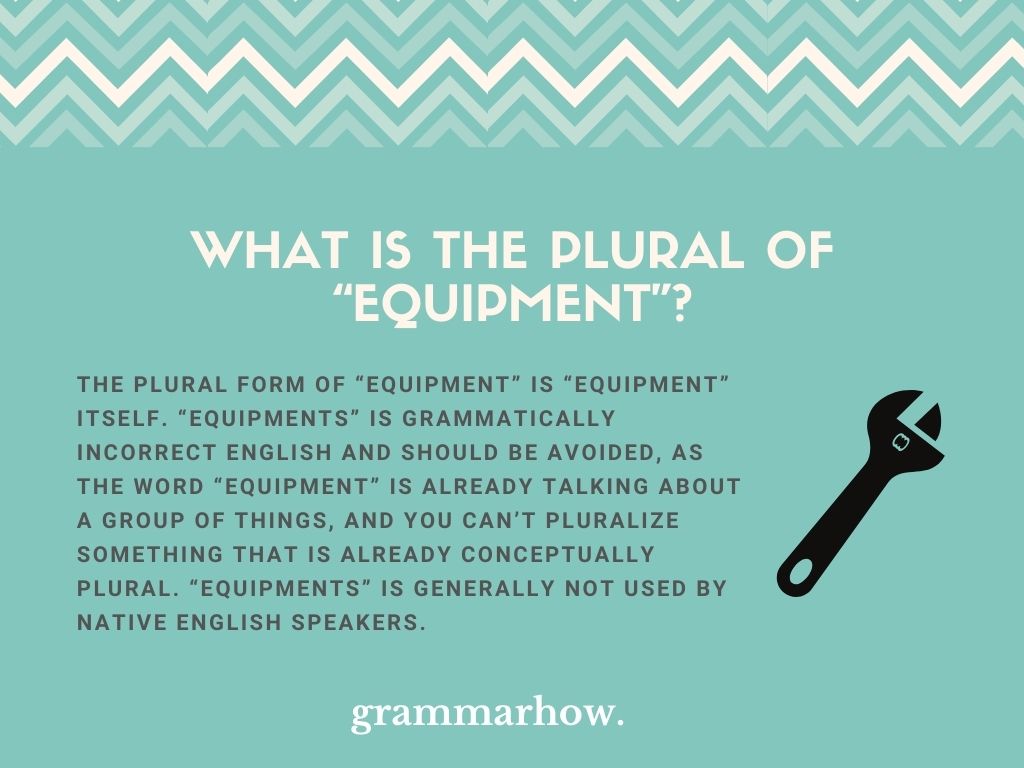The following article will talk about the word “Equipment” and whether its plural form is “Equipment” itself or “Equipments”. This is regularly a common point of confusion among speakers of the language, and this article will clarify any questions one might have about what the plural form of “Equipment” is.
What is The Plural of “Equipment”?
The plural form of “Equipment” is “Equipment” itself. “Equipments” is grammatically incorrect English and should be avoided, as the word “Equipment” is already talking about a group of things, and you can’t pluralize something that is already conceptually plural. “Equipments” is generally not used by native English speakers.

The word “Equipment” is what is known in English as a “Non-Count Noun”, or more commonly a “Mass Noun”. These are nouns that already refer to something plural, and therefore are normally not pluralized.
Some examples of “Mass Nouns” are “Furniture”, “Gold” and “Milk”. All three of these words cannot be pluralized in the standard English way, and in fact can already represent multiple things.
With few exceptions, in English, a “Mass Noun” doesn’t change form no matter the quantity of the noun that is being discussed.
Here are a couple of examples of the correct and incorrect plural forms of equipment:
- Correct: I packed all of my equipment for the hiking trip.
- Incorrect: Her equipments for writing are all on the bag.
Examples Of How To Use The Plural Of “Equipment” In A Sentence
- Correct: All of his bootlegging equipment was found in the trunk of his car after the incident.
- Incorrect: Their surveying equipments were stolen from their van late last night.
- Correct: You sure have a lot of fancy gardening tools and equipment.
- Incorrect: My golf equipments are all damaged after the fight the other day.
- Correct: It’s important to make sure your equipment works.
- Incorrect: Our equipments are brand new and functional.
- Correct: In order to win in this sport, your equipment has to be state of the art.
- Incorrect: When the engine failed, the plane’s equipments stopped working as well.
- Correct: To fix this electric outlet I will need to order some special rubber equipment first.
- Incorrect: You must have spent a fortune on all of this expensive hockey equipments.
- Correct: It’s hard to think about how all of this cooking equipment is centuries old.
- Incorrect: Her makeup equipments were damaged in the flood.
Is It “Equipment Is” Or “Equipment Are”?
The correct answer is “Equipment is”. “Equipment” is a mass noun, and mass nouns represent multiple things with a noun that is treated as singular.
Some mass nouns are an exception and get plural forms anyway, such as “water”/”waters”, but “equipment” is not considered one of those exceptions.
Is It Correct To Say “These Equipment”?
No, it is not correct to say “these equipment”. “This equipment” is the correct way to phrase that sentence. “Equipment” should be treated as a singular word.
Because “Equipment” is a mass noun, you cannot pluralize it like you would with a regular noun, and this includes a plural pronoun like “these”.
This is in spite of the fact that, conceptually, “Equipment” refers to a set of multiple items for a specific purpose or activity.
Why Does “Equipment” Not Have A Plural Form?
“Equipment” doesn’t have a plural form because it’s what’s known as a “Mass Noun”. Mass Nouns are nouns that describe an object that is plural conceptually but doesn’t have a standard plural form.
In English, the standard for plurals is adding an “s” at the end of a noun to transform it from singular to plural.
However, this isn’t the case for mass nouns. These nouns describe objects that are plural in nature, such as “equipment”, which describes a set of things.
Therefore, because “equipment” is a mass noun, it gets treated grammatically as if it was a singular noun.
Sometimes a mass noun will have a plural form anyway, and be an exception to the rule. One case of such an exception is “Water”, which pluralizes to “Waters”.
However, those exceptions remain rare, and it’s still accurate to say that mass nouns do not have plural forms, as the vast majority of mass nouns do not.

Martin holds a Master’s degree in Finance and International Business. He has six years of experience in professional communication with clients, executives, and colleagues. Furthermore, he has teaching experience from Aarhus University. Martin has been featured as an expert in communication and teaching on Forbes and Shopify. Read more about Martin here.
